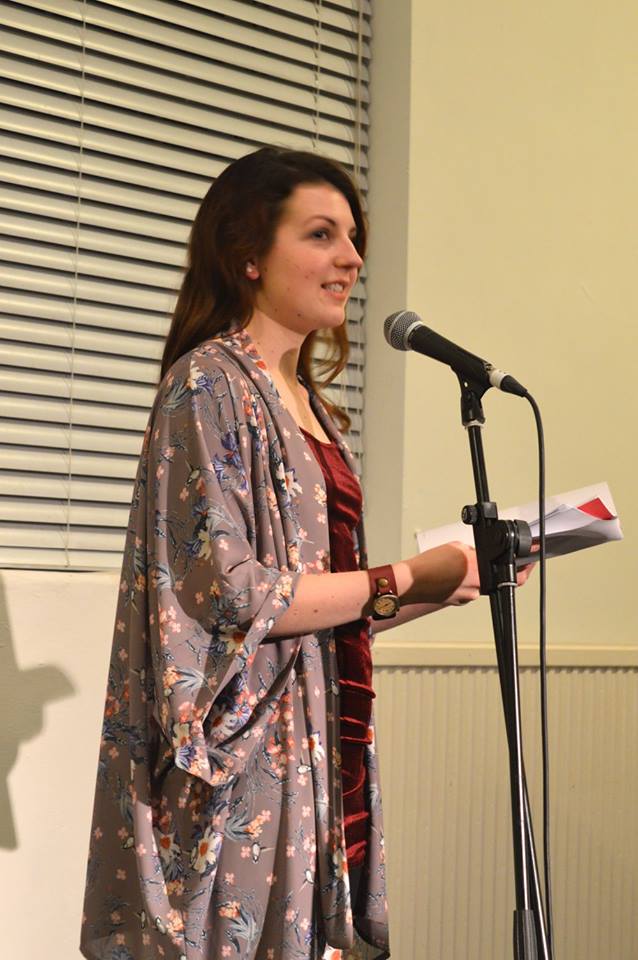
Reader, I’ve neglected you. I haven’t posted since February – and I haven’t got any good excuse to offer, not really. Life is as it ever was; it’s just as busy, just as joyful. It’s no more worrying than usual, and I haven’t relapsed into depression or SAD. Ozzie the cat is well and full of mischief. Winter has passed, and now comes spring and its sunshine. Thinking about it, that might account for my absence – I have been spending as much time outside as possible, walking and running around the park with Greg, drinking coffee out of cardboard cups, and reading. I have also been writing. This is been a productive couple of months, both in terms of the PhD and, of course, poetry. I often find that I write the most poetry when I’m supposed to working on something else, and it turns out that the last few months of the writing up year is no exception!
I have also been reading my poetry in public. I was asked to read with some other Poetry Wales poets (Richard Gwyn, Rebecca Parfitt, and Fran Lock) for Literature Wales/ Seren’s First Thursday event in February, and so I prepared a set. I figured I’d go about it in the way that you compile a playlist: start with a couple of popular ones that people seem to like (one on kickboxing and one about greyhounds called ‘How to Explain Hiraeth to an Englishman’) and then move to some darker pieces (one that I hadn’t read before on sexual abuse, and ‘On Watching Paranormal Witness’) before ending on a happier, funnier note (I can’t remember which poem I ended on, but I certainly included ‘When I Think of Bald Men’ and ‘My Colours’ in the final section).
This time last year I never would have believed that I’d be able to deliver a set of my poems with not only confidence, but pleasure. I’m not a natural performer – I’m more of an introvert – but I think there’s something about First Thursdays at Chapter Arts Centre that nurtures one’s inner performance poet. For a start, the audience are enthusiastic and welcoming; they listen carefully and appreciatively. There are regulars in the crowd who read their own work in the Open Mic part of the evening, and are greeted by Seren Poetry Editor Amy Wack as old friends. One of these regulars was kind enough to give me a copy of his pamphlet as a gift. Stephen Payne liked my greyhound poem so much that he asked me to read his, which you can find here. I love it, and was keen to read more of his work, so I now have a beautiful copy of The Probabilities of Balance.
As the title might indicate, this book is both precise and stylish. It deals with family life, parenting and childhood, includes some encounters with teachers and academics, and is playful yet poignant in tone. My favourite poem from this collection, I think, is called ‘The Career Academic’ – probably because I recognise the central character, or at least parts of his nature. This is the man who has become his research, who has no interests but his ‘enthusiasm for peptides’ and is lonely. Indeed, his ‘recent embrace/ of online dating’ only highlights his lack of understanding about forming meaningful relationships; this man goes about finding a suitable partner in a painfully rational way. Now I’ve got nothing against online dating, but this character’s actions make me shudder a little – I think because he tackles the problem of loneliness as he would approach a scientific equation. It makes me think of a cold man with a weak handshake.
This career academic lists his peer-reviewed publications on his profile page, justifying their inclusion by imagining that his ideal partner will have a chance to do their homework before meeting him:
it’s simply a matter
of managing impressions
while being true to himself,
as well as giving her
a chance to prepare,
offering a topic or two
for those first, diffident exchanges.
This rather neat ending encapsulates the Career Academic’s way of life. He has spent so long working towards a goal that is never fully reachable – as soon as you reach one milestone, the next appears on the horizon – but full of diffident exchanges. Payne’s final lines serve as a wry warning to those of us who might immerse ourselves fully in academia. It’s rather sad really. Probably every PhD student should read it.
Anyway, listening to poetry being read and recited is exciting – when it’s done well it transforms both poem and poet into something more than words on the page and the hand that wrote them. If you’ve ever heard Rhian Edwards or Kim Moore read, for instance, you’ll know what I mean. So, with that in mind, I’ve taken on a new challenge – Rebecca Parfitt and I are teaming up to participate in the Welsh branch of the national Enemies project, Gelynion/Enemies Cymru. On the 20th May, we will be performing our collaborative piece in The Abacus Rooms in Cardiff – the theme of which is a great secret for the moment, just to get your poetic tastebuds watering. Other poets like Nia Davies, Joe Dunthorne, Eurig Salisbury, Damian Walford Davies, Richard Gwyn, Zoë Skoulding, S J Fowler, Clare Potter (and many more – oh my, the line-up is good!) will also be performing their collaborations. Reader, I know I’ve neglected you. But Reader, you should come.
